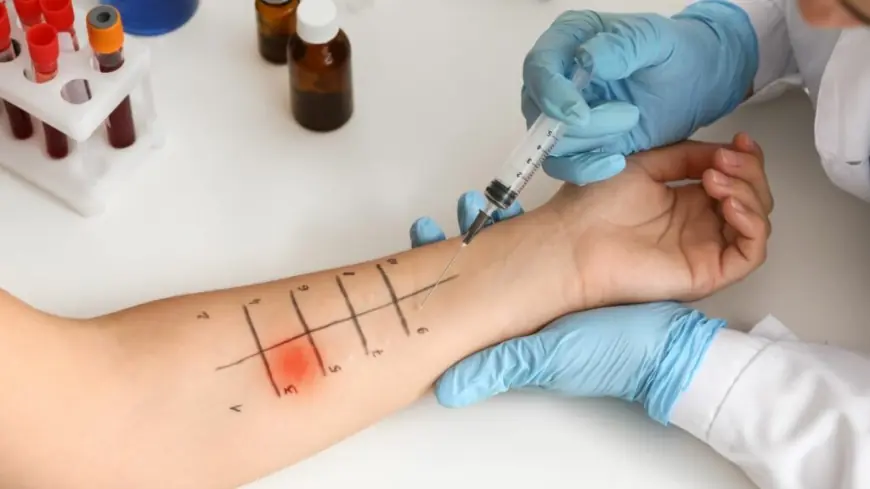Allergy Testing: Identify and Manage Your Allergies Effectively
Learn about allergy testing, its methods, and benefits. Discover how identifying triggers can lead to effective symptom management and a better quality of life.

Understanding the triggers of allergic reactions is essential for maintaining your health and well-being. Allergy testing helps pinpoint the substances causing these reactions, allowing for effective management and prevention strategies. Whether you’re dealing with seasonal discomfort, food sensitivities, or environmental allergens, testing provides clarity and actionable solutions.
What Is Allergy Testing?
Allergy testing involves various methods to determine if your body reacts to specific allergens. These can include pollen, pet dander, certain foods, or other environmental factors. The process is carried out under the supervision of medical professionals who evaluate the body’s immune response.
Testing methods are safe and can provide accurate insights into what might be causing symptoms. The results form the basis for developing a treatment plan that addresses your unique needs.
Types of Allergy Testing
There are several ways to test for allergies, each suited to different kinds of sensitivities:
-
Skin Prick Test: This is a common method where small amounts of allergens are introduced to the skin, usually on the forearm or back. A reaction, such as redness or swelling, indicates sensitivity.
-
Patch Test: Used to detect delayed allergic reactions, small amounts of allergens are applied to patches and placed on the skin for 48 hours.
-
Blood Test: This measures the presence of antibodies that indicate an immune response to specific allergens. It’s often used when skin tests aren’t an option.
-
Oral Food Challenge: This is a supervised method where small amounts of a suspected allergen are ingested to observe any reactions.
Each method is chosen based on the type of allergy being investigated, the patient’s medical history and the symptoms experienced.
Common Symptoms That Indicate the Need for Testing
Allergy symptoms vary widely but can include:
-
Sneezing, runny nose, or nasal congestion
-
Itchy or watery eyes
-
Skin rashes, hives, or eczema
-
Difficulty breathing or wheezing
-
Stomach discomfort, nausea, or vomiting
If you notice recurring symptoms that don’t seem to have a clear cause, testing can provide valuable answers. Knowing what triggers these reactions allows you to take steps to avoid exposure or seek appropriate treatment.
Benefits of Allergy Testing
Testing provides several advantages, including:
-
Personalized Care: By identifying specific allergens, healthcare providers can tailor a treatment plan to suit your needs.
-
Better Symptom Management: Understanding the triggers behind your symptoms helps in minimizing exposure and improving daily life.
-
Prevention of Severe Reactions: Identifying allergens early reduces the risk of serious complications, such as anaphylaxis.
-
Improved Quality of Life: With fewer allergic reactions, you can enjoy activities and environments with greater confidence.
Preparing for Allergy Testing
Before undergoing testing, your doctor will likely discuss your medical history and any medications you’re taking. Certain antihistamines or medications may need to be paused to ensure accurate results.
It’s important to follow the guidelines provided by your healthcare provider. This ensures the testing process is smooth and the results are reliable.
What to Expect During the Test
The procedure varies depending on the method used but is generally quick and minimally invasive. For skin tests, small amounts of allergens are applied to the skin and monitored for reactions. Blood tests involve drawing a sample for analysis in a laboratory.
While testing may cause slight discomfort, such as minor itching during a skin test, it is usually well-tolerated. Your healthcare provider will be present to address any concerns and ensure your safety.
Interpreting the Results
Once the testing is complete, the results are analyzed to identify any allergic responses. A positive reaction indicates sensitivity to a particular allergen, which will be explained by your doctor. They will also discuss the next steps, including treatment options and lifestyle adjustments to reduce exposure.
Understanding these results is key to managing allergies effectively. Clear communication with your healthcare provider helps ensure you have the information needed to make informed decisions.
Treatment Options Based on Allergy Testing
The treatment plan developed after testing may include:
-
Avoidance Measures: Strategies to limit exposure to allergens, such as using air purifiers or modifying your diet.
-
Medications: Antihistamines, decongestants, or corticosteroids can alleviate symptoms.
-
Immunotherapy: Allergy shots or sublingual tablets may be recommended for long-term relief by gradually desensitizing your immune system to allergens.
These treatments are aimed at reducing symptoms and improving your overall health. Regular follow-ups ensure the plan remains effective as your needs evolve.
When to Consider Allergy Testing
If you’ve experienced symptoms that affect your daily life or suspect an allergy, it’s important to seek testing. Early diagnosis can prevent complications and provide clarity on how to manage your condition. Testing is particularly valuable for individuals with family histories of allergies or those living in environments with high exposure to potential triggers.
Advancements in Allergy Testing
Innovations in medical technology have made testing more accurate and accessible. New techniques, such as molecular allergy testing, allow for a detailed analysis of allergens at a molecular level. This improves diagnostic precision and enhances treatment outcomes.
Telemedicine has also expanded access to allergy consultations, making it easier for patients to connect with specialists and receive guidance without the need for in-person visits.
Conclusion
Allergy testing is a valuable tool for identifying triggers and developing effective strategies for managing symptoms. By understanding what causes allergic reactions, individuals can take proactive steps to reduce exposure and improve their quality of life. Whether through preventive measures, medications, or advanced treatments, the insights gained from testing pave the way for better health and well-being.

 izan
izan 










